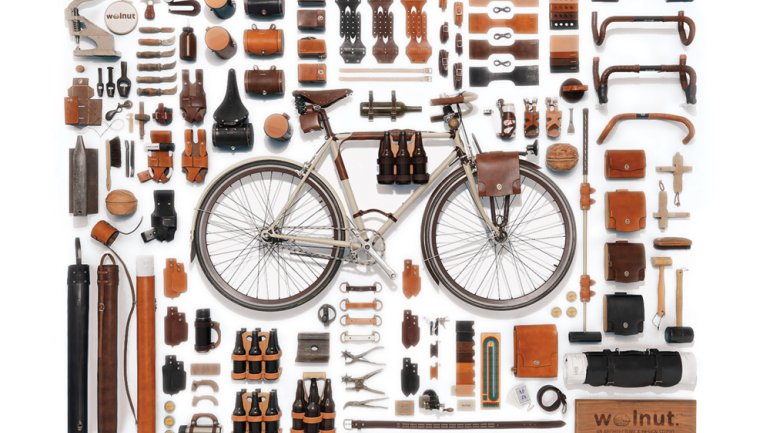Leather By Necessity
Leather By Necessity
Geoffrey Franklin always had an interest in making things. But the Walnut Studiolo founder began designing products for a living only when he couldn’t find the right accessories for his daily bike commute in Portland. Without any formal leatherwork training, the eighth-generation Oregonian designed and handcrafted what would be the first of many products now available from his workshop – a leather U-lock holster that could permanently live on his bicycle.
His material choice was no accident. “I strategically chose leather because of its combination of strength, durability, and flexibility, its ancient roots in human history, and its historic presence on the bicycle,” says Franklin. He also has a personal connection to cowhide. “I was familiar with leather horse tack from my time spent on our family farm, so it was a comfortable material to me.”
A graduate of the University of Oregon architecture school, Franklin runs Walnut Studiolo with his wife, Valerie; he designs and crafts the products in the workshop while she runs the business. The studio opened in 2009, the same year Franklin founded Walnut, an architecture and design firm, with partner Douglas Ouderkirk. “The study of architecture will forever influence the way I see the world,” Franklin says, “but architecture as a means of income is a diminishing part of my life.”
To represent the small size of their studio, the couple call their leather workshop a “studiolo” – an architecture term for a small, private study room. Franklin says he can spend as little as a day or as much as three years to come up with a concept. “My first images for any new project always come from a pencil on paper. I use big brown sheets of butcher paper and spread my ideas out.” While he also likes to use digital modeling, it is usually one of the last steps in the process.
The workshop currently produces 200 to 300 pieces a month with the help of three part-time employees. The typical customer for bicycle accessories is an urban commuter – mainly younger professionals. It may be no surprise, then, that the most popular products include a six-pack frame cinch (a way to carry beverages on your bike) and a bicycle frame handle to help lift and carry your ride. The workshop has added non-bike-related products to its repertoire, including a blueprint tube, a travel cribbage board made of laser-engraved birch plywood, and a new collection of leather drawer pulls and cabinet handles. Sourcing quality materials is a point of pride for the company. “We only use USDA beef cattle hides vegetable-tanned in the United States,” says Franklin.
The designer continues to find inspiration in the material he first encountered on the family farm. “The vegetable-tanned leather we use can be molded like clay or hardened into armor,” he says. “There is a bit of magic in that. And here is the secret – we are still finding new ways to use it.”
Rita Catinella Orrell is a design journalist in New Jersey. Follow her on Twitter and Instagram.

